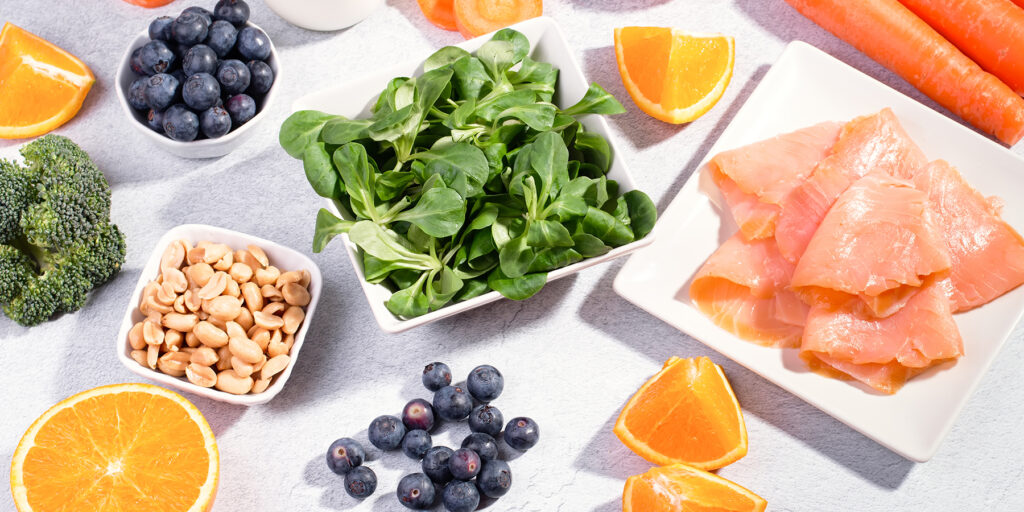Maximizing Health: Optimizing Vitamin Intake Through Diet
by siteadmin

Vitamins are vital nutrients that our bodies require in small amounts to function properly. While supplements can be beneficial in certain cases, obtaining vitamins through a balanced diet is generally the most effective way to meet your nutritional needs. In this blog post, we’ll explore practical strategies for optimizing your vitamin intake through dietary choices, helping you harness the power of food to support your health and well-being.
Understanding Your Nutritional Needs:
Before diving into dietary strategies for optimizing vitamin intake, it’s important to understand your individual nutritional needs. Factors such as age, gender, activity level, and health status can influence your vitamin requirements. Consulting with a healthcare professional or registered dietitian can help you determine your specific needs and tailor your diet accordingly.
Incorporate a Variety of Nutrient-Rich Foods:
Aim to include a wide range of nutrient-rich foods in your diet to ensure that you’re getting a diverse array of vitamins and minerals. Fruits, vegetables, whole grains, lean proteins, and healthy fats should all have a place on your plate. Be sure to choose a variety of colors and textures to maximize your nutrient intake.
Focus on Whole, Unprocessed Foods:
Whole, unprocessed foods are rich in vitamins, minerals, and other essential nutrients, making them the cornerstone of a healthy diet. Choose whole grains such as quinoa, brown rice, and oats over refined grains, and opt for fresh fruits and vegetables instead of canned or processed varieties whenever possible. Whole foods provide more nutrients and are often lower in added sugars, sodium, and unhealthy fats.
Include Plenty of Fruits and Vegetables:
Fruits and vegetables are packed with vitamins, minerals, fiber, and antioxidants that promote health and well-being. Aim to fill half of your plate with colorful fruits and vegetables at each meal, incorporating a variety of options such as leafy greens, berries, citrus fruits, cruciferous vegetables, and bell peppers.
Choose Lean Protein Sources:
Protein is essential for building and repairing tissues, supporting immune function, and maintaining muscle mass. Choose lean protein sources such as poultry, fish, beans, lentils, tofu, and Greek yogurt to minimize saturated fat and calorie intake while maximizing nutrient density.
Don’t Forget Healthy Fats:
Healthy fats, such as those found in nuts, seeds, avocados, and olive oil, are essential for brain health, hormone production, and nutrient absorption. Include small amounts of healthy fats in your diet to add flavor and satiety without excessive calories.
Be Mindful of Portion Sizes:
While nutrient-dense foods are beneficial for health, it’s important to be mindful of portion sizes to avoid overeating. Use visual cues such as your hand or everyday objects to estimate portion sizes, and pay attention to hunger and fullness cues to prevent overconsumption.
Optimizing vitamin intake through diet is an essential component of maintaining overall health and well-being. By incorporating a variety of nutrient-rich foods into your meals, focusing on whole, unprocessed foods, and paying attention to portion sizes, you can ensure that your body receives the vitamins and minerals it needs to thrive. Remember that small changes to your diet can have a big impact on your health, so start by making simple, sustainable changes that you can maintain in the long term.
Vitamins are vital nutrients that our bodies require in small amounts to function properly. While supplements can be beneficial in certain cases, obtaining vitamins through a balanced diet is generally the most effective way to meet your nutritional needs. In this blog post, we’ll explore practical strategies for optimizing your vitamin intake through dietary choices,…
Recent Posts
- Maximizing Health: Optimizing Vitamin Intake Through Diet
- Unlocking the Power of Vitamins: Understanding Their Functions and Benefits
- Nourishing Your Body: A Culinary Journey with Healthy Recipes
- Nourishing Your Body: The Power of Nutrition
- The Great Debate: Raw vs Cooked – Which is Better for Your Health?
